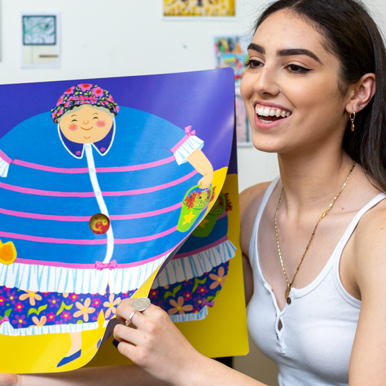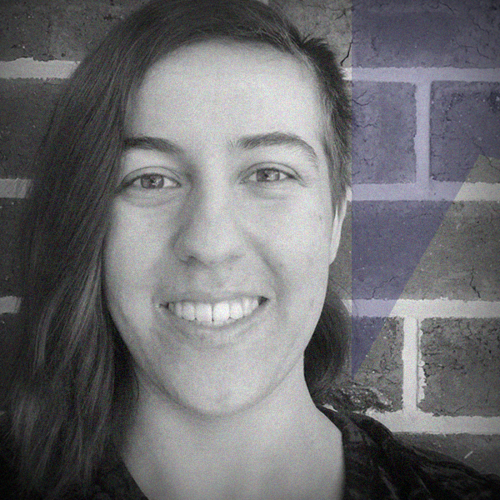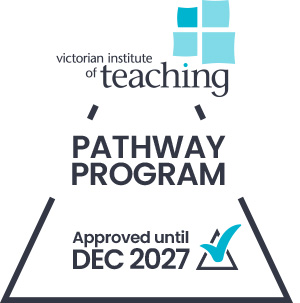Associate Degree of Early Years Studies
Overview
2 years full time / 4 years part time
2 years
February, July
February
Enrol with us and help give children the best start in life
Our Associate Degree of Early Childhood course is a supportive program with a personal approach that recognises students as individuals.
It is a pathway into our Bachelor of Education (Early Years and Primary).
Apply now to gain:
- the skills and professional qualification to be employed as a qualified educator within children’s services, as recognised by the Australian Children's Education & Care Quality Authority (ACECQA).
- excellent practical skills developed through an integrated program.
- knowledge about children from birth to 12 years, through a blend of structured classes and professional placements.
- knowledge about educating children from birth to 12 years.
- access to content of very contemporary material – there is a strong focus on social justice and equity, covering multiple perspectives.
On successful completion of the Associate Degree, you are able to articulate into our Bachelor of Education (Early Years and Primary).
Career Pathways
Where will the Associate Degree of Early Years Studies take me?
This qualification leads to careers including room leader/educator in long day care, kindergarten assistant, out of school hours/vacation care and Oocasional care as registered with Australian Children's Education & Care Quality Authority ACECQA.
With further studies in the Bachelor of Education (Early Years and Primary), further careers in Education including primary school teacher.
Study Pathways
The Associate Degree of Early Years Studies is both a pathway into and an embedded exit point for the Bachelor of Education (Early Years and Primary). Once you successfully complete the Associate Degree you may apply to complete the Bachelor of Education (Early Years and Primary).
Attend an Information Session
Course Details
Delivery methods
Your professional placement includes an embedded practical component of 45 days placement in child care and kindergarten settings.
- Practicum
- Classroom
Class Schedule
This course includes a practicum component of 45 days (360 hours). Timetable is 2 days per week, 9am to 5pm.
Units of Study
Credit points are a basic measure of student workload. All subjects are given a credit point value. Most subjects at Melbourne Polytechnic are 12 credit points. A normal full-time annual workload is 96 credit points. The academic year is divided into two main semesters; full-time students usually enrol in 48 credit points each semester, part-time students usually enrol in 24 credit points each semester or less.
| Code | Subject | Elective | Description | Year | Semester |
| EDU101 | Philosophies and Theories of Teaching and Learning | Core | This first-year subject provides you with an introduction to education through an investigation of the early years of education’s historical, philosophical, political and sociological bases and its intersections with broader curriculum theory and praxis. You will be introduced to different perspectives of education to understand how philosophies, theories and beliefs influence teachers’ decisions and practices in the classroom. You will explore diverse educational theories and examine contemporary perspectives and issues in early childhood and primary education in Australia and internationally. You will reflect on yourselves as learners, as well as your own backgrounds and experiences of education and the impact of these on your own identities as teachers. You will develop broad understandings of the range of contemporary practices available to teachers across the early years continuum and develop and reflect on your own philosophies of education. | 1 | 1 |
| EDU102 | Performing Arts | Core | This is the first of a series of three arts subjects that develop your knowledge of performance arts, specifically dance, drama and music. It introduces you to strategies to support children’s engagement with and learning through the arts. The subject introduces education students to the role of the performing arts in the holistic development of children and adults. You will learn the importance of creativity, curiosity, self-expression and multi-modality in the learning process and how to effectively plan, facilitate and support this through the performing arts and deepen this critical reflection. You will come to appreciate the benefits of the performing arts as a way to explore personal, cultural and social worlds and as a vehicle for self-expression and communication, and its advantages in an anti-bias pedagogical approach to support diversity and inclusion. You will experience the arts as a possible space to explore the value of multiple perspectives and as a context for transformative education. | 1 | 1 |
| EDU103 | Curriculum Approaches in Education | Core | This first-year subject provides an exploration of curriculum theory and how curriculum development principles intersect with concepts of individual and group dynamics in learning to support equitable educational outcomes for children across diverse contexts. You will engage with broad principles of curriculum theory and explore the model of the curriculum cycle to investigate key aspects of observation, documentation, interpretation, planning, implementation and reflection in teaching and learning. You will develop your teaching skills by undertaking, documenting and interpreting diverse observations of children and collecting relevant data to use to evaluate student learning and modify teaching practice. You will identify the ways that data is used to inform individual and group learning plans and support the planning and delivery of learning programs that maintain and build on learning outcomes. You will become skilled in drawing from diverse theoretical understandings of the child and their social contexts in order to consider the most effective and equitable ways to support children’s learning. | 1 | 1 |
| EDU104 | Introduction to Wellbeing | Core | In this first-year subject you will learn about the range of factors that influence children’s growth, learning and development with a focus on social and emotional behaviour. You will explore practices, strategies and experiences which promote wellbeing, including classroom and behaviour guidance. A key focus includes understanding how relationships influence the developing child and their sense of self-efficacy and self-worth. A consideration of major theories that have influenced contemporary understandings of wellbeing will be discussed, along with the ways these can be applied to support children’s social and emotional learning. | 1 | 1 |
| EDU105 | Play-Based Pedagogies | Core | This first-year subject provides an introduction to curriculum theory and praxis and critically examines play-based learning as a pedagogical approach in early years education. You will begin to develop your knowledge of the connections between learning, teaching and play, and the skills required to question and reflect on this in order to implement responsive, reciprocal and respectful teaching practices across diverse contexts in the early years. | 1 | 2 |
| EDU106 | Language, Literacy and Communication (Birth – 8) | Core | This subject investigates how language and emergent literacy develop in infants and young children from birth to 8 years. You will investigate theories and approaches to supporting early language and literacy development, taking into account the experiences of children from a diverse range of linguistic and cultural backgrounds. You will consider the relationship between family, community, care and educational settings and their implications for practice. You will also learn to assess, monitor and plan children’s language and literacy development to enable them to become effective communicators. | 1 | 2 |
| EDU107 | Global Perspectives and Comparative Education | Core | This first-year subject introduces you to the global context of early childhood education, educational debates, changes and reforms, both locally and globally. You will be introduced to framework documents, political contexts and the practical elements of education around the world. You will examine the concept of comparative education and the benefits and limitations involved with this process. You will have the opportunity to critically examine chosen countries alongside the Australian context and begin to recognise global approaches to education, and the need for collaborative knowledge building when working in the profession at the political level and as teachers in the field. | 1 | 2 |
| EPX102 | The Emerging Professional: Childcare (Birth-2 years) 15 days | Core | This first-year subject is the first of seven professional experience subjects that is designed specifically to support you as emerging professionals prior to your first childcare placement. The focus of this subject is establishing and maintaining relationships with children and colleagues as the foundation for ethical and equitable engagement within teaching communities. You will gain knowledge about how the relevant frameworks and policies, anti-bias curriculum and the curriculum cycle inform teaching and learning. You will also explore a range of teaching strategies, develop an in-depth understanding of the importance of using inclusive and multimodal data-gathering techniques and be introduced to using Mahara ePortfolios as a documentation tool for your learning. | 1 | 2 |
| EDU001 | Working Ethically (Elective) | Elective | This first-year subject provides an exploration of legislative frameworks and pedagogical practices that support working ethically in early childhood education settings. You will engage with a variety of legislative frameworks to develop an understanding of the expectations within each framework. Additionally, you will develop your ability to link theory with practice and begin to consider how you can use the frameworks to guide your future practice. This subject includes a particular focus on ethical practice, including being a professional and developing ethical relationships with children, families and other educators. You will have the opportunity to critically reflect on your current understandings of ethical practice and develop goals for future teaching practice. | 1 | 2 |
| EDU201 | Visual Arts and Media | Core | This is the second year arts subject, focusing on media arts and visual arts. You will learn how to engage children in learning by integrating these art forms into other discipline areas, such as literacy and numeracy. You will engage with contemporary research to build your philosophical and pedagogical position on how the arts can both engage and support learners. The subject will require you, through hands-on art experiences, to question your own philosophical and pedagogical biases in order to deepen your understandings of the core themes: multiple perspectives, intentional & strategic teaching, social justice & equity and critical reflection. This subject requires you to investigate how children engage with and develop knowledge and skills through the arts. | 2 | 1 |
| EDU202 | Early Years Mathematics | Core | This subject explores the theoretical perspectives and pedagogical strategies in the teaching and learning of numeracy and mathematics from birth to 8 years. This includes exploration of key issues associated with how children acquire early mathematical concepts, processes and knowledge and problem-solving skills through meaningful experiences in music, play, art, languages, manipulative and other hands-on experiential learning activities. The content addresses the transition from informal to formal mathematical concepts in young children and the importance of the home numeracy environment to engage and successfully support children's learning of mathematics, including oral language and vocabulary development. | 2 | 1 |
| EDU203 | Exploring Science and Technology in the Early Years | Core | This second-year subject explores the diverse theories that underpin science education and how these inform curriculum design and teaching practices. It critically examines the historical contexts of science education with particular attention to equity considerations such as gender and culture in relation to teacher confidence and efficacy. You will gain knowledge about scientific concepts and a range of approaches to teaching science and continue to develop the skills to plan, implement and evaluate early learning science experiences that support children to critically problem-solve and develop creative thinking skills. | 2 | 1 |
| EPX201 | The Evolving Professional 1: Childcare (3-5 years) 15 days | Core | This second-year subject is the second of seven professional experience subjects and is designed to support you as evolving professional prior to your early childhood placement with children aged three to five years old. The focus of this subject is for you to explore the significance of professional relationships and identity to learning and teaching, within the context of leadership, advocacy and teacher as researcher. You will revisit and refine your data-gathering techniques drawing on the Mosaic approach and gain knowledge about implementing each stage of the curriculum cycle. You will also expand your repertoire of teaching strategies, further enhance your documentation skills and examine the purpose and significance of critically reflective practice. | 2 | 1 |
| EDU204 | Number and Algebra | Core | This subject is designed to give you a deep understanding of the mathematics and numeracy needed for quality teaching and learning in primary school contexts. You will explore theories of mathematics and effective numeracy teaching and learning practices, with an emphasis on number (numeration and computation) and algebra, and the thinking necessary to build meaningful approaches to these core mathematics strands. Real-world problem-solving and application of mathematics are emphasised in numeration and computation with whole numbers and fractions. Topics in algebraic thinking are also examined using this approach, to ensure primary school children develop an informal knowledge of algebra concepts and processes for later years. You will develop a critical understanding of the societal and cultural diversity that informs mathematics and numeracy teaching. Local, Indigenous and international educational research and policy are drawn upon to inform the development of professional knowledge and skills and dispositions. | 2 | 2 |
| EDU205 | Australian Indigenous Education | Core | This second-year subject provides a theoretical framework for understanding colonisation and its impacts broadly across Australia and applying this to understand the impact of colonisation on local Indigenous peoples. You will develop skills in implementing curriculum that addresses the realities of Australia’s history and in employing culturally appropriate and respectful approaches to introducing Indigenous Australian content within and through curricula for all children. | 2 | 2 |
| EDU206 | Critical Education in a Global World | Core | This second-year subject develops understanding of the theories, principles and pedagogies that inform critical education. It critically examines the relationships among power, society, oppression, education and change as a philosophical and pedagogical exploration. This critical examination is then used to draw attention to the connection between leadership and advocacy and highlight the importance of these for creating critical communities. In this subject, you will gain knowledge of a range of strategies for building critical communities and professional partnerships. You will also further develop your skills to critically reflect on your own identities and articulate how this informs your capacity to advocate for social justice and transformation across diverse contexts. | 2 | 2 |
| EPX202 | The Evolving Professional 2: Primary (Victorian Curriculum Focus) 15 days | Core | This second-year subject is the third of seven professional experience subjects and is designed to support you as evolving professional prior to your first primary school placement. The focus of this subject is for you to explore and define professionalism in teaching practice, examine your philosophies in the primary school context and build communication skills with learners and the school community. It is an opportunity to refine lesson-planning skills that have been developed in other subjects, and consider these through an interdisciplinary lens. You will also explore a range of teaching strategies to build your repertoire for working with learners. | 2 | 2 |
| EPX101 | The Emerging Professional: Childcare (Birth-2 years) 15 days | Elective | This second-year subject is one of seven professional experience subjects and is designed specifically to support you as emerging professionals prior to your first childcare placement. The focus of this subject is establishing and maintaining relationships with children and colleagues as the foundation for ethical and equitable engagement within teaching communities. You will gain knowledge about how the relevant frameworks and policies, anti-bias curriculum and the curriculum cycle inform teaching and learning. You will also explore a range of teaching strategies, develop an in-depth understanding of the importance of using inclusive and multi-modal data gathering techniques and be introduced to using Mahara ePortfolios as a documentation tool for your learning. | 2 | 2 |

Fees & Costs
Commonwealth-supported Places (CSPs)
| Per year | $4120 |
| Per semester | $2060 |
Fee-paying Places
| Per year | $20200 |
| Per semester | $10100 |
| Per year | $19800 |
| Per semester | $9900 |
When you are studying higher education courses you may qualify for FEE-HELP payments for part or all of your tuition fees. FEE-HELP loans do not cover materials costs.
Fees displayed are effective for new applications received on or after 1st of November. Tuition fees do not include textbooks, course materials or overseas student health insurance and visa fees.
After initial deposit, international students are able to pay tuition fees in installments, four times per year.
For more detailed information please read the International Student Fees.
Scholarships on offer

'We’d been discussing what projects we had coming up that we needed to go and buy materials for. And so then the scholarship came and it was just a sigh of relief.'
Requirements
|
ADMISSION REQUIREMENTS Associate Degree of Early Years Studies |
|
|
COURSE ADMISSION REQUIREMENTS |
ALL APPLICANTS
|
|
APPLICANTS WITH RECENT SECONDARY EDUCATION (CURRENT YEAR 12 or within the past two years) |
|
|
APPLICANTS WITH VOCATIONAL EDUCATION AND TRAINING (VET/TAFE) STUDY (including Diploma ECEC) |
Applicants may demonstrate the equivalence by completing the multiple-choice component of the Special Tertiary Admission Test (STAT). Refer below for information. Applicants who have successfully completed a Diploma ECEC may be awarded credits to a maximum of one year towards the Bachelor degree. |
|
APPLICANTS WITH PRIOR HIGHER EDUCATION STUDY |
A completed or partial completion of a Bachelor degree level qualification may satisfy Academic Pre-requisites |
|
APPLICANTS WITH WORK AND LIFE EXPERIENCE |
Applicants may demonstrate the equivalence by completing the multiple-choice component of the Special Tertiary Admission Test (STAT). Refer below for information. |
|
PRIOR TO ENROLMENT (PROFESSIONAL PLACEMENT) |
|
|
SPECIAL TERTIARY ADMISSIONS TEST (STAT) |
Applicants must not have been enrolled in secondary studies for at least two years. Applicants for our course should apply for the STAT multiple choice. |
Higher Education Admissions Criteria
As well as the specific entry requirements above, Melbourne Polytechnic admits students on the basis of the following categories:
If you have already studied higher education: Y ou may meet the admissions criteria for higher education at Melbourne Polytechnic if your highest level of study since leaving secondary education is a higher education course, such as a university degree.
If you have studied a VET course: You may meet the admissions criteria for higher education at Melbourne Polytechnic if your highest level of study since leaving secondary education is a vocational education and training (VET) course.
If you have recent secondary education: You may meet the admissions criteria for higher education at Melbourne Polytechnic if you are a recent secondary education student whose admission is primarily based on the completion of Year 12 within the past two years.
If you have work and life experience: You may meet the admissions criteria for higher education at Melbourne Polytechnic if you have work and life experience and left secondary education more than two years ago and have not undertaken vocational education training (VET) or higher education study since then.
Academic: Australian Year 12 equivalency.
English: Academic IELTS 6.5 overall with no individual band below 6.5 or Melbourne Polytechnic recognised equivalency.*
*Applicants who provide evidence that they have studied English for at least five years in Australia, Canada, New Zealand, Republic of Ireland, United Kingdom or the United States are exempt.
Further: Applicants are required to participate in an interview* to assess personal attributes suitable for teaching AND complete an essay task on the day of the interview.
*Interviews by Skype or telephone are available for overseas or interstate applicants.
Prior to enrolment (professional placement): Must possess a valid Working with Children Check prior to commencing placement. Must comply with the COVID-19 vaccination status in line with the Department of Education and Training mandate.
Next Steps
Melbourne Polytechnic is committed to providing transparency to the admissions process. In line with this commitment, we provide you with information that will help in making informed choices about your future studies.
Find out more about Melbourne Polytechnic’s commitment to admissions transparency.
Applicants for this course will need to have met the academic requirements. Meeting the minimum admission criteria does not guarantee entry into this course. Past academic performance may be considered.
You may also be required to attend an interview to discuss your career plans, aptitude and understanding of your chosen course of study and the requirements of tertiary study. (This may be conducted face-to-face or by through a video conference call using Skype or other application).
During your interview, you may be asked to provide:
- Your CV outlining your relevant work and life skills and experience
- Any letters of reference from employers
- Documents relating to prior study including course transcripts and subject outlines from other Higher Education Providers if you wish to apply for credit
When we receive your application, the International Office will be in contact with you shortly to discuss your application and provide you additional instructions.
If you'd like to speak to one of our International Office staff directly, call 1300 635 276
News from around Melbourne Polytechnic

12 ways to manage stress
Stress is a normal, natural physical and mental response but sometimes it can get the better of us - here's 12 ways to chill out and regroup.
Read more here
What makes a great teacher?
As far as career choices go, those that offer the most satisfaction are ones that assist the greater good of the community. Teaching is sitting right at the top of that list.
Read more here
Working out the life balance
All work and no play makes us absolute dullards, but too much play can make us ineffective and unfocused, so how do we achieve this magical balance?
Read more here
Turn your business idea into a success
Congrats budding entrepreneur, you have a brilliant idea - now what? Find out how to turn your idea into a successful business
Read more hereRecognising Organisations

Victorian Institute of Teaching (ADEYS) The Associate Degree of Early Years Studies has accreditation from VIT as a pathway program.
Local student means; you are an Australian citizen or permanent resident, a New Zealand citizen or a permanent humanitarian visa holder.